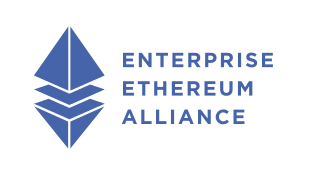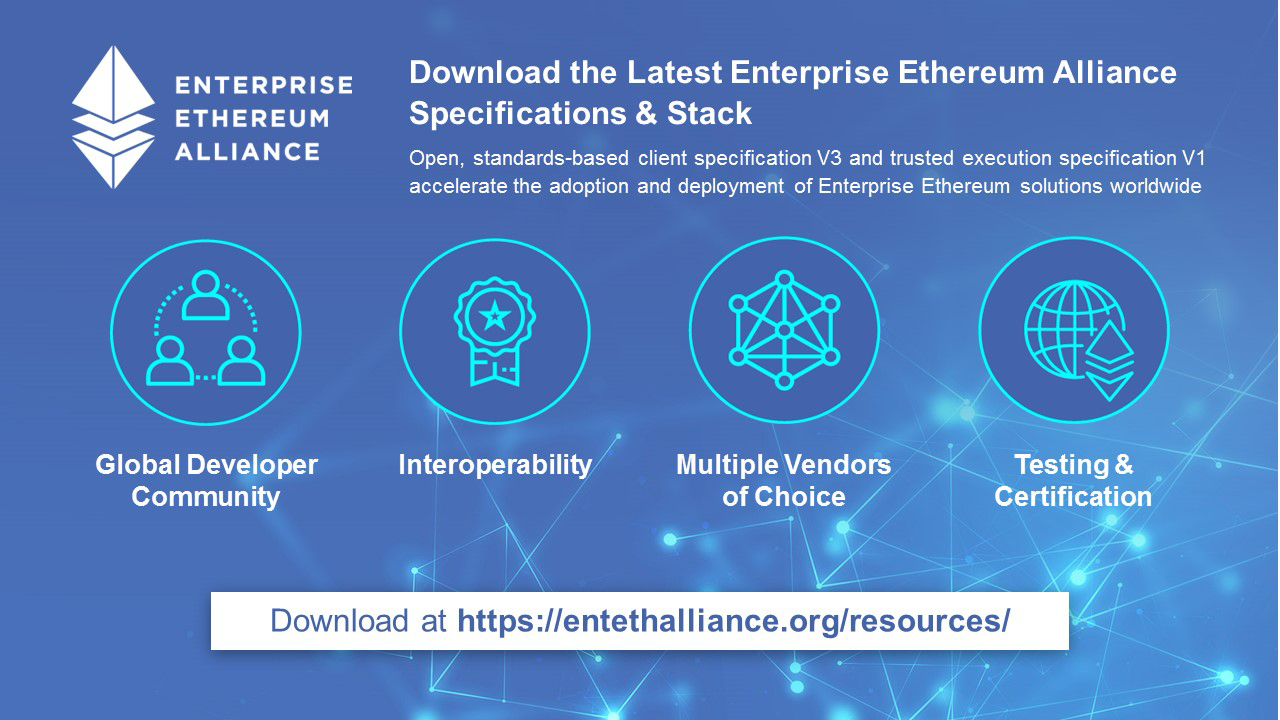Enterprise Ethereum Alliance Releases Off-Chain Trusted Compute Specification 1.0
May 13, 2019
New Application Programming Interfaces Help Programmers Achieve the Privacy, Low Latency, and Throughput Required for Enterprise Use Cases in Fintech, Supply Chain, IoT, and Other Applications.
New York – May 13, 2019 –The Enterprise Ethereum Alliance (EEA) today announced the public availability of the EEA Off-Chain Trusted Compute Specification V1.0 document, available for free download at https://entethalliance.org/technical-documents/. With this release, programmers have a set of standard application programming interfaces (APIs) that make it easier to write, inspect, share and re-use programs supporting blockchain transactions that require privacy, oracle services, and compute-intensive workloads. The EEA also announced today the EEA Enterprise Ethereum Specification V3 document and its availability for free public download.
- Meet with the EEA during Blockchain Week NYC at Consensus, May 13-15, Booth #106 & Murray Hill East Meeting Room, New York Hilton Midtown
- Register for the free Token Taxonomy Initiative webinar, May 16 from 9:00-10:00 a.m.
The EEA Off-Chain Trusted Compute Specification V1.0 is intended to allow enterprises to choose the trusted compute technology that works best for their use case. The 1.0 version of the specification has been reviewed for compatibility with the following trusted compute methods:
- Trusted Execution Environments (TEEs)
- Zero-Knowledge Proofs
- Trusted Multi-Party-Compute (MPC)
As enterprise needs and trusted compute methods develop, the EEA expects to review additional off-chain trusted compute methods in the future.
“Many enterprise blockchain use cases have demanding requirements for privacy, security, throughput, and latency that are difficult to achieve. Temporarily moving some transactions off-chain for computation elsewhere, and then returning a summary to the main chain is a promising method for achieving such requirements,” said EEA Executive Director Ron Resnick. “I would like to thank Banco Santander, ConsenSys, iExec, Intel, Microsoft, Oracalize, Chainlink and all the EEA members that provided contributions to this important specification.”
The Off-Chain Trusted Compute Specification V1.0 has been designed to support the following enterprise needs:
- Private transactions on a blockchain between mutually-untrusting parties without disclosing transaction details to other parties who also have access to the blockchain
- Disclosure of partial information to chosen parties on a blockchain, while maintaining the confidentiality of other information from those same chosen parties
- Offloading selected transactions from the main blockchain to a trusted compute environment to improve performance
- Attested oracles to provide trusted external information needed for some enterprise use cases
“New paradigms will emerge from this specification such as business-to-business-to-customers, known as B2B2C. Customers will be able to provide paid services to companies by giving controlled access to their data without losing ownership. We encourage enterprises and programmers to try different trusted compute methods, and discover which works best for their use case,” said Jean-Charles Cabelguen, chair of the EEA Trusted Execution Environment Task Force and iExec chief of Innovation and Adaptation. Read EEA Member iExec’s blog post on the specification. “The EEA recognizes that trusted compute needs to be autonomous and we thank Intel for helping us make this an open platform specification through our task force work.”
For trusted compute to work, the results and recording of any off the main chain computations must be trustworthy. Various methods of achieving such trust have been proposed, and the EEA Off-Chain Trusted Compute Specification APIs are intended to be method independent.
“Intel is proud to contribute to the Off-Chain Trusted Compute Specification; we believe this important work will help organizations implement trusted computing. Intel is committed to helping solve the privacy and security challenges that will further enable blockchain adoption,,” said Tom Willis, EEA founding board member, and a director at Intel’s Open Source Technology Center. Read EEA Member Intel’s blog post on the specification.
About the EEA
The Enterprise Ethereum Alliance (EEA) is a member-driven standards organization whose charter is to develop open blockchain specifications that drive harmonization and interoperability for businesses and consumers worldwide. Our global community of members is made up of leaders, adopters, innovators, developers, and businesses who collaborate to create an open, decentralized web for the benefit of everyone. The EEA also hosts the blockchain-neutral Token Taxonomy Initiative formed to define and understand tokens. To learn more about the Token Taxonomy Initiative, please reach out to [email protected]. For additional information about joining the EEA, please reach out to [email protected].
Follow the EEA


